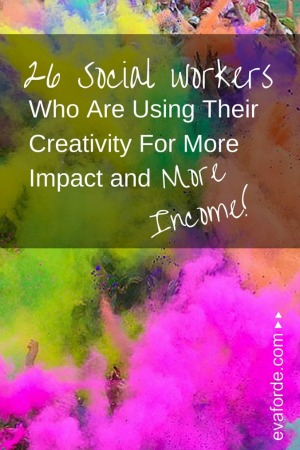 Mental Health Roundup
Mental Health Roundup
This contains some of the latest news in social work, healthcare, private practice and more!
This week’s wrap-up has 5 main themes:
- Healthcare
- Advocacy/Cultural Sensitivity
- Therapy/Relationships
- Mental Health & Technology
- Career/Private Practice/NonProfit
Healthcare
- Anxiety & Women: Hormones, Sleep & What You Can Do – Dr. Christina Hibbert – “Anxiety… most common mental health issue in women… several forms of anxiety disorder… also a common component of hormonal shifts… “gold standard” for anxiety treatment is a combination of anti-anxiety medication… and psychotherapy…”
- Exercise and meditation together help beat depression – Science Daily – a Rutgers study demonstrated that the combination of both methods/twice a week for only two months successfully reduced the symptoms of depression for a group of students by 40 percent.
- Groundbreaking Call for Universal Depression Screening – mental health is starting to be integrated into overall health as seen by U.S. Preventive Services Task Force (USPSTF)’s recent recommendation that primary care providers screen all adults for depression.
- Gut health and healthy brain function in children with ADHD and ASD – Michelle Harrell suggests providing nutritional therapy and restoring healthy flora back into the gut for healing, and raises some of the inherent barriers.
- Next Phase of the OpenNotes Movement – Susan Mende shares the highly positive results of the use of Open Notes (80% of patients chose to read their notes; patients feel more empowered/knowledgeable about their conditions, 99% of patients want the practice to continue) and reports that it will be spreading to 50 million patients nationwide.
- Telehealth Will Be a Billion-Dollar Industry By 2018 – Payer support, consumer support, price curve, plan design, and cultural acceptance are all playing a role in the demand for telehealth.
- Which psychotherapies are best for college students with depression? – as per Shirley Reynolds, Cognitive Behaviour Therapy (CBT) and Behavioural Activation (BA) seem to be the most promising methods; however, most studies did not meet standards of research rigour.
Advocacy/Cultural Sensitivity
- Adapting to climate change – podsocs interview with Karen Appleby – Certain populations are more vulnerable during extreme weather events and with climate change, implications for social workers.
- Anti-bullying program focused on bystanders helps the students who need it the most – Science Daily – the effective program included role-playing exercises to increase the empathy of bystanders and computer simulations that encourage students to think about how they would intervene to reduce bullying.
- Higher Education Widens Global Inequality – to counteract this, Audrey P. Scott recommends universities expand their need-blind financial aid to international students or improve multinational schools to better cater to poorer populations.
- Language and decisions in child welfare – what’s the connection? – Emily Keddell – “a summary of a recently published article… if I use problem-focused as opposed to strengths-based language to describe the same family, a very different picture of the family would be conveyed…”
- New Tools for Conversations About Bias, Race and Change – research shows that it helps to talk about race, people’s fears and unconscious bias directly. The purpose of the new toolkit is to help people step into their discomfort so that we can all get more comfortable talking about race and bias.
- The rich even have a better kind of stress than the poor – as per Carol Graham, the poor not only experience more stress than the rich on a daily basis, but it is also more likely to be “bad” stress, i.e. associated with circumstances beyond their control. This, in turn, is translating into increasing mortality rates among uneducated, lower-income whites in their middle age years.
- Sexual assault – two worrisome public events – Peter Choate – “these cases highlight how society continues to fail in their obligation to protect people from sexual abuse and assault… we have not created an environment where sexual assault can be spoken about…”
- Shining A Light on Disabled Black Authors & Their Work – Vilissa Thompson – “Disability in literature is gravely underrepresented in general; when you add race into the mix, it gets even dimmer regarding visibility… this list of disabled Black authors… displays the creativity and gumption these authors had in writing stories…”
- Yes, Anger Does Influence My Work for Racial Justice – Relando Thompkins-Jones: “criminal indifference and ignorance… ways that whiteness uses difference to justify privilege… There are things we shouldn’t get used to, and we should be mad about it…”
Therapy/Relationships
- 8 Tips for Ignoring Bipolar Pain – Natasha Tracy shares tips that she uses to manage the pain she wrestles with such as: acknowledging the pain, focusing on something positive, meditating and more.
- The Anxious Social Work Mind (Part 1) – Part 2 – Danna Bodenheimer – We feel incredibly pressured to see improvement in our clients… Most sessions are slow and unmemorable. Yet, some of the moments that we create… will be mutually magical and transformative…”
- Are You a Guilt Tripper? – Julie Hanks shares both questions to identify whether you/your client may be engaging in this passive-aggressive manner to get some of your needs met, as well as some healthy antidotes.
- CBT and Mindfulness for Depression – Robert Hindman- “one common mindfulness strategy… non-suicidal depressed clients… We view rumination as strategy clients use to cope with depression… First… identify beliefs about rumination… list the advantages and disadvantages… teach the client how to use mindfulness as a strategy to disengage from rumination…”
- Do Therapists Age Out? – TherapyDoc provides a wonderful metaphor illustrating how older therapists are able to help younger clients just as well (if not better) than their younger peers.
- How Community and Family Advocates Can Empower Financial Change by Focusing on Hope – Reeta Wolfsohn describes how “hope opens the door to change while hopelessness closes the door.”
- Installments – Martha Crawford – “I spend hours making up bills – and I forget to hand them to my clients to collect my fee… I own my worth… I like getting paid… Seekers, from every walk of life… come to my door… Like a safe deposit box I am filled with other people’s treasures…”
- Learning Your Family’s Love Language – Mercedes Samudio illustrates the importance of understanding each member of your family’s preference in terms of receiving/giving love via quality of time, affirmations, acts of service, gifts and physical touch.
- Parenting Teenage Girls – Social Work Podcast interview with Lisa Damour, Ph.D. – “a teenage girl’s erratic and confusing behavior is actually healthy, necessary, and natural… how parents can reframe their daughter’s thoughts feelings and actions… when they [parents] have reason to worry…”
- Parenting Techniques for Traumatized Kids – Family Care Network/SJS recommendations include parenting towards child’s developmental age (vs. chronological age), giving child a sense of control through choice giving and using natural consequences.
- The story of your brain – All in the Mind interview with David Eagleman – “half of who you are has to do with your genes… and the other half has to do with every experience that you’ve had… think about the brain… like a neural parliament where you have all these different parties fighting it out to steer the ship of state, to control decisions, and the outcome of the battle determines the action…”
- Writing as a tool for change – Dima Dupéré illustrates how therapeutic journaling incorporates many CBT elements, albeit in a more free-flowing and creative manner, and how you/your client may benefit from this tool.
Mental Health & Technology
- 9 Mobile Apps for Social Workers – McKenzie Smith describes several apps to use to enhance your work with clients such as PTSD Coach, Compass CoPilot, ClassDojo, TF-CBT Triangle of Life game and more.
- Guidelines for using Digital & Social Tech in the Classroom – Laurel Hitchcock shares a set of guidelines that represent her own practices for using digital and social technologies as a social work educator.
- #MacroSW – Archive of Chat About Leveraging Technology for Social Good & Announcement of Upcoming 1/18 Chat about ACEs & Building Practices & Policies to Avoid Re-traumatization
- Popular Social Media Apps – Don’t Get Fooled – Thesocialworkpad recommends the Safe Smart Social site and a video it has put together to help you know what criteria to use when evaluating apps.
- #PreventVetSuicide: #SPSM on conf tweets and tips – archive of the conference/chat that took place on Feb 7; “Dr. Shulkin: Preventing Veteran suicide is at the top of the list of our efforts… @DocForeman: Shulkin is championing use of tech and innovation to improve #Veteran #suicide #prevention…”
- Start App via @Iodine – Sean Erreger shares a new app that allows patients to track how they are feeling/responding to a new antidepressant Rx and share this information with their doctor; it incorporates PHQ-9, the standard measure to track depression symptoms.
- TrueCrypt No More: The Last Nail In Its HIPAA Coffin Found – Roy Huggins shares how this Free Open Source computer encryption program has been found to have a flaw that makes it no longer work for HIPAA Security needs on Windows computers.
- Using Technology in Addiction Social Work Practice – inSocialWork podcast interview with Nancy Roget about how technology/applications can be used to aid in the treatment of substance addicted individuals, and in clinical supervision.
Career/Private Practice/NonProfit
- 26 Social Workers Who Are Using Their Creativity For Impact – Eva Forde highlights the creative sites/activities of some social workers you may be familiar with and some whom are likely to be new.
- Advice on Predatory Journals and Publishers – APA provides guidance on what to look out for when receiving an email invitation to submit a manuscript to a journal, so as to avoid questionable publishers/journals that may make misleading promises and/or charge fees for publication.
- A Counselor’s Story of Falling Behind in Writing Notes – 7 Tips for Shortening Your Therapy Notes – Maelisa Hall notes that time management is a function of the emotional connection you have with paperwork, gives 7 helpful note-taking tips and a catch-up plan video.
- How to start a part-time private practice – Practice of the Practice shares 10 tips including finding a place to rent that is only 20% of what you bring in, filing your practice as a business LLC, S-Corp with LegalZoom (but still confirming with an accountant/lawyer that all is ok for your state) and more.
- Navigating the Messy Middle: Private Practice One Year Later – Selling the Couch Podcast interview with Dr. Agnes Wainman about the key steps she took to create her private practice including identifying characteristics and qualities of her ideal client and subsequently targeting all content to this client.
- No Shows and Late Cancellations – Allison Puryear provides you with some helpful guidelines and sample text that you may use for your practice.
- Top 5 Numbers to Know in Private Practice – as per Samara Stone, it’s important to track/know the amount of time and money you are investing on marketing, number of new client inquiries, number of new clients scheduled, client balances/total accounts receivable and number of clients you need to see to breakeven every month.
Like this post? Please share it!






Amazing selections! Thanks for including me. I’ll link over here today!
Thanks so much, TherapyDoc!